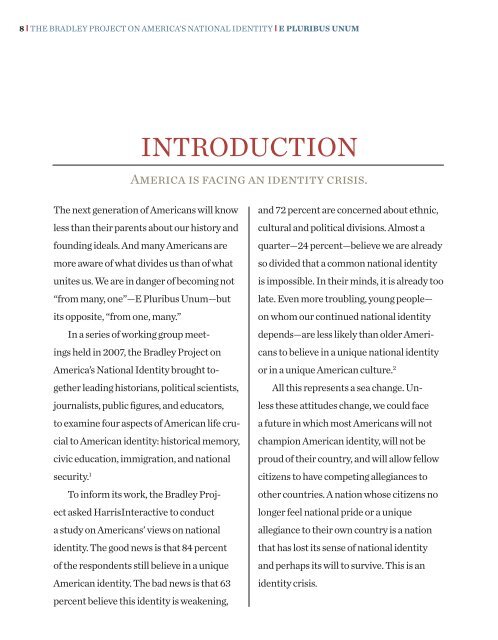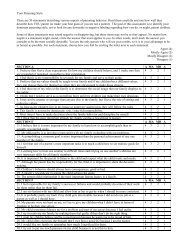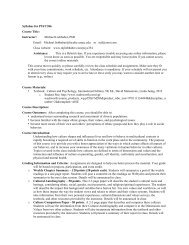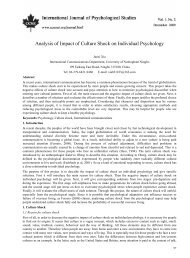Bradley Project 2008-Bradley Project On America_s National ...
Bradley Project 2008-Bradley Project On America_s National ...
Bradley Project 2008-Bradley Project On America_s National ...
- No tags were found...
Create successful ePaper yourself
Turn your PDF publications into a flip-book with our unique Google optimized e-Paper software.
8 I The <strong>Bradley</strong> <strong>Project</strong> on america’s <strong>National</strong> identity I e pluribus unumintroduction<strong>America</strong> is facing an identity crisis.The next generation of <strong>America</strong>ns will knowless than their parents about our history andfounding ideals. And many <strong>America</strong>ns aremore aware of what divides us than of whatunites us. We are in danger of becoming not“from many, one”—E Pluribus Unum—butits opposite, “from one, many.”In a series of working group meetingsheld in 2007, the <strong>Bradley</strong> <strong>Project</strong> on<strong>America</strong>’s <strong>National</strong> Identity brought togetherleading historians, political scientists,journalists, public figures, and educators,to examine four aspects of <strong>America</strong>n life crucialto <strong>America</strong>n identity: historical memory,civic education, immigration, and nationalsecurity. 1To inform its work, the <strong>Bradley</strong> <strong>Project</strong>asked HarrisInteractive to conducta study on <strong>America</strong>ns’ views on nationalidentity. The good news is that 84 percentof the respondents still believe in a unique<strong>America</strong>n identity. The bad news is that 63percent believe this identity is weakening,and 72 percent are concerned about ethnic,cultural and political divisions. Almost aquarter—24 percent—believe we are alreadyso divided that a common national identityis impossible. In their minds, it is already toolate. Even more troubling, young people—on whom our continued national identitydepends—are less likely than older <strong>America</strong>nsto believe in a unique national identityor in a unique <strong>America</strong>n culture. 2All this represents a sea change. Unlessthese attitudes change, we could facea future in which most <strong>America</strong>ns will notchampion <strong>America</strong>n identity, will not beproud of their country, and will allow fellowcitizens to have competing allegiances toother countries. A nation whose citizens nolonger feel national pride or a uniqueallegiance to their own country is a nationthat has lost its sense of national identityand perhaps its will to survive. This is anidentity crisis.





